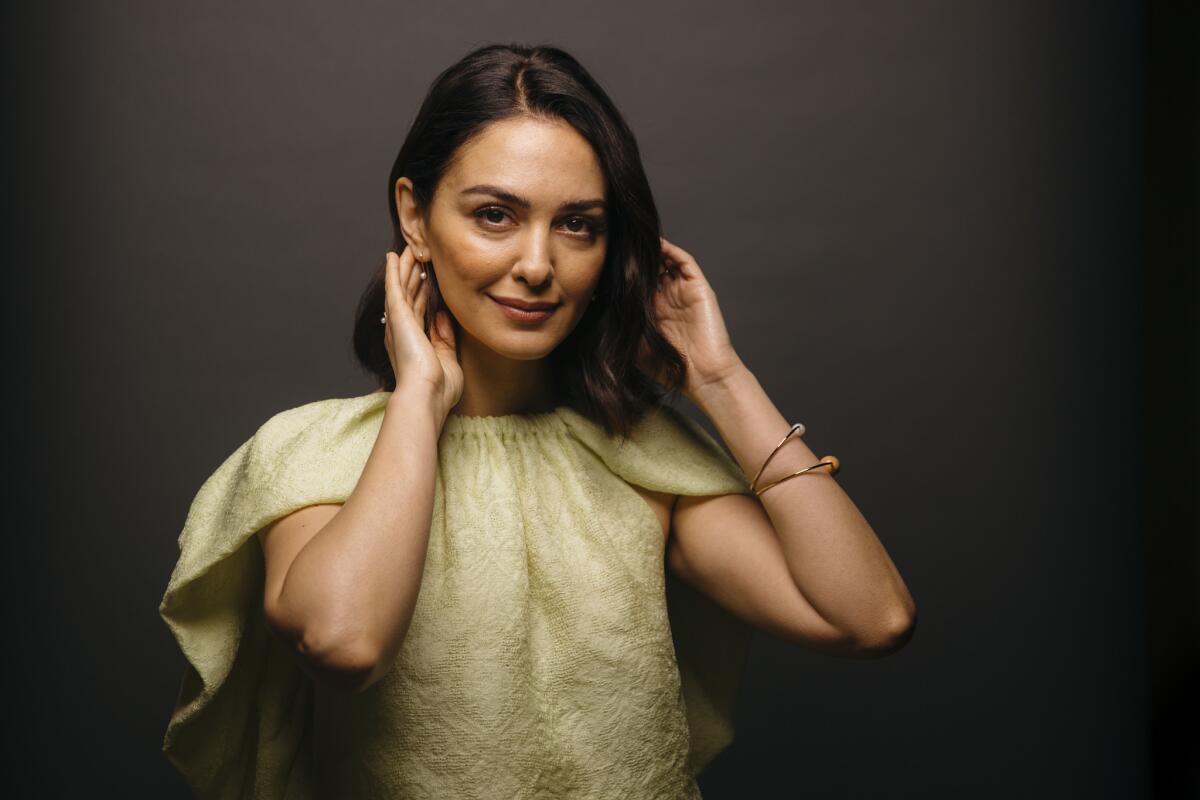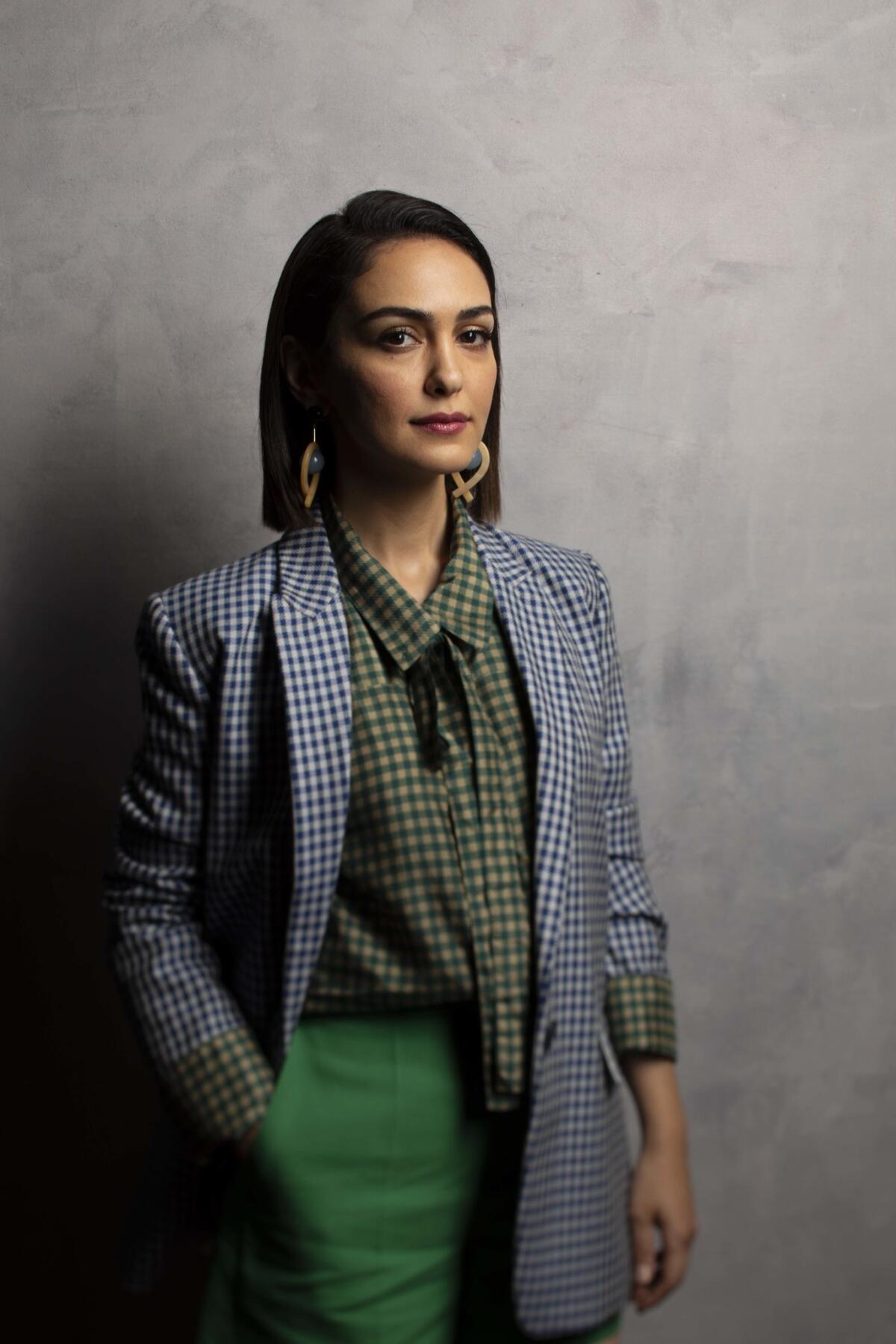The Conversation: ‘Counterpart’s’ Nazanin Boniadi on the complexities of playing Middle Eastern roles

Reporting from New York — Nazanin Boniadi has what may be the juiciest role — make that roles — of her career in “Counterpart,” a science-fiction-infused espionage thriller now in its second season on Starz.
The drama, costarring Oscar-winner J.K. Simmons, relies on a bold premise: an alternate version of the world was created in the waning days of the Cold War.
Now covert operatives travel between “Prime” and “Alpha” worlds through a portal in — where else? — Berlin. (Think of it as “The Spy Who Came in From the Cold” meets “Sliding Doors.”) Boniadi plays Clare, a particularly zealous agent who sneaks across the border and — spoiler alert — assumes her doppelgänger’s identity.
Despite its outré concept, the series, created by Justin Marks, is rich with “metaphors and allegories of what’s going on today,” says Boniadi, who is excited by its sociopolitical themes.
Born in Iran after the revolution but raised in London, the UC Irvine graduate is also an activist who’s fought to bring attention to human rights abuses in her native country through work with the Center for Human Rights in Iran, Amnesty International USA and the Council on Foreign Relations.
“I always say as an actor you get to portray the human condition,” she says, “but as an activist you get to change the human condition.”
“Homeland,” in which she played a hijab-wearing CIA analyst who challenges the agency’s latent Islamaphobia, “was the first time I got to talk about current affairs and foreign policy in connection to my work.” Her upcoming projects are just as culturally relevant: In addition to “Counterpart,” she’ll soon be seen with Dev Patel and Armie Hammer in “Hotel Mumbai,” a gripping account of the 2008 terror attack on the Taj Hotel in Mumbai, and in Jay Roach’s untitled film about Roger Ailes, playing former Fox News correspondent Rudi Bakhtiar.
Clare is such an intriguing, layered character. What’s it like to play her?
I’m Middle Eastern; the last thing I want to do is play a villain. It’s such a cliché. When I got the role, my hesitation was always that, essentially, she’s a terrorist. She’s been brainwashed and indoctrinated to go out and kill people who she thinks are the other.
I auditioned for this role and it was open to all ethnicities. My initial conversation with Justin was, “Please don’t change the name.” I don’t want her to all of a sudden be named “Fatima.” And he said, “I have no intention of doing that. There are people who look like you whose names are Clare.” She is a multifaceted woman indoctrinated to do bad things. And I love the idea that if you can learn to hate, surely you can also learn to love. So that’s really her journey in Season 2: Can she shed herself of this brainwashing and indoctrination? Can she find out who she really is? Essentially she’s leaving a cult.
So is the colorblind nature of the part a departure for you?
I found myself being at the top of producers’ and studios’ list for Middle Eastern roles, which is a beautiful position to be in, but it does cage you in as an actor. Most Caucasian actors, they don’t lead with their ethnicity, they’re just playing a human being. So with minority actors, it is a struggle. I find [“Counterpart”] refreshing after the last few projects, consecutively playing Adnan Salif on “Scandal,” Fara Sherazi on “Homeland” and even Esther in “Ben-Hur” — all Middle Eastern.
How does “Hotel Mumbai” fit into that?
For me, it’s an interesting commentary on socioeconomic divides, because you’re throwing people in like my character [a wealthy, Muslim British-Iranian woman], who was raised with a golden spoon in her mouth and has never had to fight for anything in her life, with people who live in the slums. And when you’re in that situation, money, religion, race, ethnicity, language don’t separate us. Bullets don’t discriminate. We’re all in it together.
The fate of the “Hotel Mumbai” film was uncertain for a time following the collapse of the Weinstein Co. That must have been frustrating for you.
People don’t realize, when someone does something truly horrible, there are direct victims but there are also peripheral victims who suffered in the sense that they lost their careers, they had their films tank because of this. It’s really livelihoods at stake — collateral damage. We’re lucky we found [distributor] Bleecker Street and have a second chance, but I imagine that didn’t happen for a lot of films.
How do you strike the balance between paying your bills and bearing the burden of representation?
I had the blessing and privilege of being on “Homeland.” The show gets criticized for various things, but I found how they treated my character to be very delicate. I wanted to make sure that after that I went into something that was equally layered. I was offered a lot of roles that were very one-dimensional, and I said no. As an actor you want to make money and you want to have momentum, but I’ve always been an advocate for thinking long term as opposed to the instant gratification of “I’m working!” How about just finding the right project that resonates with your heart and your creativity?
I had to audition for “Counterpart” while on location in Australia shooting “Hotel Mumbai.” I had my reservations culturally about what was involved with the role. There was a nudity clause, there was kissing a woman for the first time. And immediately the first thing my mind went to was, “What will the Persian community think?” But then I realized, this is what I do for a living. Now I look back and I think I can’t imagine having turned this job down. I would have kicked myself every day. It really is the most therapeutic role.
How so?
I think it’s very self-explanatory. Hopefully, people will just understand sometimes there are personal traumas that you don’t ever talk about publicly but you pour it into your work. There are things that have happened in my personal life that I don’t feel comfortable publicly discussing, but I found a way to through this show and this role — it’s catharsis. There’s a trajectory for this character that mirrors mine. I’ve never been an assassin or a terrorist, but this idea of shedding indoctrination and finding out who you are for me is a strong one. It has been extremely therapeutic for me to be able to put it out into the world through my art as opposed to openly discussing it.
Are you referring to your past experience with Scientology? [Boniadi reportedly left the organization.]
I’d rather not say. Some things we just talk about through art.
I understand. Let’s talk about your family’s decision to leave Iran. How did that inform your work as an advocate?
I was born in the direct aftermath of the revolution in Iran. I was 20 days old when my parents fled. They didn’t want to raise their daughter in a social, legal and political climate that was growing increasingly oppressive toward women. Women were protesting against compulsory hijab at the time in the hundreds of thousands. They were being imprisoned and lashed and beaten and forced into submission. My parents fled to London and became political refugees. They led a very comfortable life [in Iran] and they were forced to accept menial jobs. When I see people suffering or disenfranchised or having their rights taken away from them, I feel compelled to want to speak on their behalf.
These women are the Rosa Parkses of Iran ... protesting against compulsory hijab at great personal costs. We owe it to them to include them in our movement.
— Nazanin Boniadi
Have you ever visited Iran?

I went to Iran when I was 13 for two months. I was walking down the street with my uncle — my mother’s brother. My mom was walking behind us and we were stopped by a member of the plainclothes militia. He said, “Can you show me your marriage certificate?”
I was 13, my uncle was 45. He thought [my uncle] was walking with his wife. It was just heartbreaking. It was so foreign to me. And now I’m persona non grata, so I definitely can’t go back. I know what they do.
My friend, who’s a brilliant human rights lawyer, and I wrote a Washington Post op-ed because we wanted to shine a light on what’s happening in Iran. [Twelve] months of protests [against economic, social, political and environmental corruption] and really it’s getting no news coverage. These women are the Rosa Parkses of Iran; they’re protesting against compulsory hijab at great personal costs. I feel like what’s happening with the #MeToo movement, Time’s Up and the Women’s March in the U.S. and the anti-compulsory hijab is not a coincidence. They may not be organized under the same banner, but it really is a global awakening of women’s rights. And so we owe it to them to include them in our movement.
What was it like to grow up in exile?
My father has never been back to Iran in 39 years. My mother was just back once with me; now she can’t go back to because of me. Her brother, my uncle, has Stage 4 lung cancer. Because of the travel ban, it’s very hard for him to come here. People talk about the Muslim-majority travel ban, but to put it in perspective, that’s been a short-lived policy. Exiles have been living in exile from their homeland for decades.
The Iranian government kills dissidents; they imprison and torture people who are outspoken against them. So it’s a really hard thing for me to think about the hundreds of thousands of Iranians, if not millions, who have relatives inside Iran. They’ll die without seeing them, and that’s what breaks my heart. That should be a basic human right, to travel, to be with your loved ones. I think any system, regime, politician that deprives you of family is corrupt.
As someone who has championed women’s rights, are you optimistic about change in the industry after #MeToo and Time’s Up?
There’s more of an awareness of how men treat women and what they demand of women and what’s OK and what’s not OK. It’s still not where it needs to be, but I do feel a shift. Some men come up to me and they say, well, I’m scared and I’m, like, well, I understand, but we’ve been scared for a very long time. I think it’s a matter of opening your heart to why are you scared and maybe ask questions of your your fellow men. There might be one or two incidents where people get wrongfully accused or something gets sensationalized. But having been through a horrific ordeal myself, I can tell you that listening to women matters.
MORE ON “COUNTERPART”
Review: Starz thriller ‘Counterpart’ gives J.K. Simmons two worlds in which to blow our minds
It gets complicated on ‘Counterpart’ but worth the effort, says J.K. Simmons
See the most-read stories in Entertainment this hour »
Twitter: @MeredithBlake
More to Read
The complete guide to home viewing
Get Screen Gab for everything about the TV shows and streaming movies everyone’s talking about.
You may occasionally receive promotional content from the Los Angeles Times.






